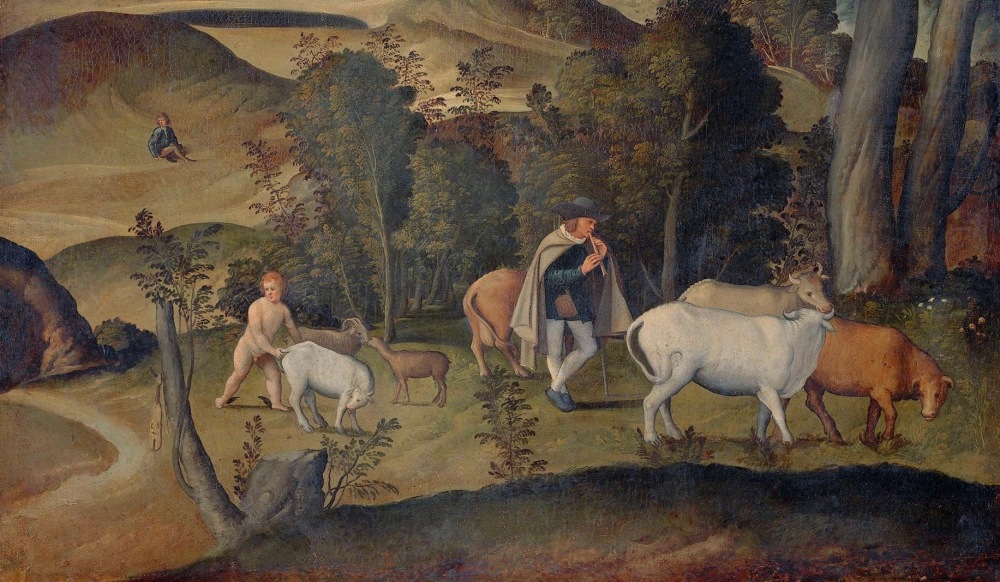In the ancient world, Apollo was understood as the “keeper of flocks.” This is a vital role for this God. He protects the Aryan flock and, as a good shepherd, breeds it among itself to better the breed, as would any good Shepherd. Here the Aryan protects his flock from the poaching Bride Gathering Semite.
The Semite as poacher is seen perhaps most definitively in Mercury’s theft of Apollo’s flock, wherein Apollo’s shepherd staff and herd is traded for the lyre. Jacob’s darkening and theft of Laban’s sheep in Genesis can be understood as a repetition of Mercury’s theft of Apollo’s sheep as this study explicates.
Here a commonly supposed etymology of Apollo’s name is key. Indeed, some scholars believe that the name Apollo is derived from the Doric Apella (ἀπέλλα) which originally meant variously “wall,” “fence for animals” or “assembly.”
References to enclosures and occasionally walls appear also in the JEM in the name meanings of characters intended as Aryan. Three examples in comic books are the X-man Angel, Warren Kenneth Worthington, Sgt. Rock’s iconic first rival Joe Wall and Hawkeye, Clinton Francis Barton. The names that comprise Hawkeye’s alias, while containing the meaning “enclosure,” have multiple meanings that ultimately indicate him a Jew. Hence the fair-haired archer superhero, consistent with his depiction in the comic, appears to be indicated a WASP-presenting Jew much like the first Ant-man Hank Pym.
More generally, name meanings that carry the same name meanings as those ascribed to Apollo may appear as Aryan identifiers in JEM. This may include for example the name meaning “the destroyer” which is also guessed, albeit less commonly, to be the name meaning of Apollo. The comic book Hulk adversary Glenn Talbot is perhaps one example of this.
In JEM, gardens may also be understood as synonyms of enclosures. Indeed, the etymology of the word garden derives from words like the Old English geard or the Gothic gards, both meaning “enclosure.” These words, in turn, derive ultimately from Proto-Indo-European (PIE) root gher- “to grasp, enclose.” The reference here is especially to the Garden of Eden or a primordial Mesopotamian Garden of the Gods. The Garden of Eden is understood as a walled enclosure guarded by Cheribum, Aryan figures as this study explicates. As this study reveals, it is best understood as an Aryan “Gene Garden” coveted by Jews. The notion of a flock guarded or enclosed by Apollo or the Biblical figure of Laban likewise carries this essential meaning.

There are many profound suggestions with everything we’ve covered thus far. One is Apollo emerges as a synonym for “wall.” This should have resonance with the contemporary reader. Here walls protecting Aryan populations gain a greater symbolic significance with their association with this protecting Aryan God. Indeed, hatreds of such Aryan-protecting-walls may be understood symbolically as hatreds also of Apollo.
Two, Apollo emerges as a synonym for church which also means “assembly” or, metaphorically, “flock.” Here though, importantly, in contrast to the Christian Church, he’s not the “wife” of a Jewish male God. Three, with the meaning “assembly,” Apollo becomes indistinct from his flock. Hence as Yahweh becomes a synonym for Jewry, as this study explores, Apollo likewise becomes a synonym for Aryans. Therefore, as Jews collectively are understood as a free, ruling, powerful, active and victorious God through the metaphor of Yahweh, Aryans collectively are understood as a free, ruling, powerful, active and victorious God through the metaphor of Apollo.
Finally, Apollo emerges as a synonym for the Garden of Eden, which, again, is an “Aryan Gene Garden.” Here we should consider that the Garden of Eden also appears in JEM as a metaphor for paradise. Indeed, in the Modern Hebrew Gan Eden, גן עדן, translates as “paradise,” “heaven,” “Eden” and “Elysium.” This is consistent with a New Testament understanding. There the Eden from which man fell in Genesis becomes synonymous with the heaven supposedly promised to him by Christ.
Hence even the “afterworld,” understood as actual or metaphorical (as expressed through one’s scion) is tied to a eugenic Apollonian state or realm. In other words, if a vain, personal salvation were a possibility for a fallen Aryan “Adam,” a reality no living man can surmise, it would come, according even to JEM, only through the striving toward a eugenic, Apollonian state. Hence, by definition, a dedication to a Eugenic Aryan breeding is requisite in order to reenter or reform “Eden” whether metaphorically or actually.

Revelation confirms the promised afterlife and the Garden of Eden synonyms. It also confirms many other things. Here we find the following illuminating passage:
“He who has an ear, let him hear what the Spirit says to the churches To him who is victorious, I will grant to eat of the tree of life which is in the Paradise of God.”[1]
But what does it mean? First, with language like “he who has an ear,” we are called to listen closely for encoded messaging. Second, Spirit, whether a reference to Athena’s animating breath, the Goddess Psyche or the figure of Eve, we understand as an Aryan genetic element as this study reveals. Here the fact that the Greek word “pneuma” is being used may emphasis the idea of a secret being passed in this careful language. To wit, one is listening to the “wind” or “breath.”
Third, the word for church here is ecclesia. It means, in the Christian context, Church. However, in the non-Christian Greek context from which Christianity emerges it means “assembly.” It was specifically a word used to describe the assembly of citizens in a city-state. Fourth, Tree of Life is a synonym for Aryan genetics as this study reveals. It’s reasonable to understand it as well as the passive feminine aspect of the Aryan as opposed to the active solar element.
Fifth, the word for paradise, paradeiso means “park,” or “garden.” It derives from an ancient Persian word meaning “enclosure.” Sixth, the word for God here, theou, is vague. In the New Testament it may mean “Gods,” a “God” generally or “God” singularly. It was a word that long pre-dated the New Testament and used to reference reigning Gods.
Let’s read the passage again with a clearer understanding based on all that we have learned:
“He who has an ear, let him hear what the [Aryan woman] says to the [Apollos] To him who is victorious, I will grant [access to] the [Aryan woman] which is in the [Apollo/Aryan Gene Garden] of [The Greek Gods].”

Here Christ, a Jew whose title means “anointed” and is a reference to Baptism, a symbol of Semitic and Aryan admixture, becomes the Jewish way to “Paradise” or at least for the period “Paradise” may sustain them. Yet by this very same token Christ leads Aryans away from paradise by definition. To them, he becomes the “wise serpent” of Eden, pretending to be a “dove” or Holy Spirit. For Aryans, Apollo, who is a synonym of the Garden of Eden in its protected form, is the straight, A to B path back to “paradise.” He is the light –the celestial light– and the way. It is for this reason we venerate Apollo and announce his return.
This we Apollonians will call “the Eden Proof.”
[1] Revelation 2:7
3 thoughts on “Apollo, the Wall, the Enclosure, the Garden, the Assembly and the Eden Proof”